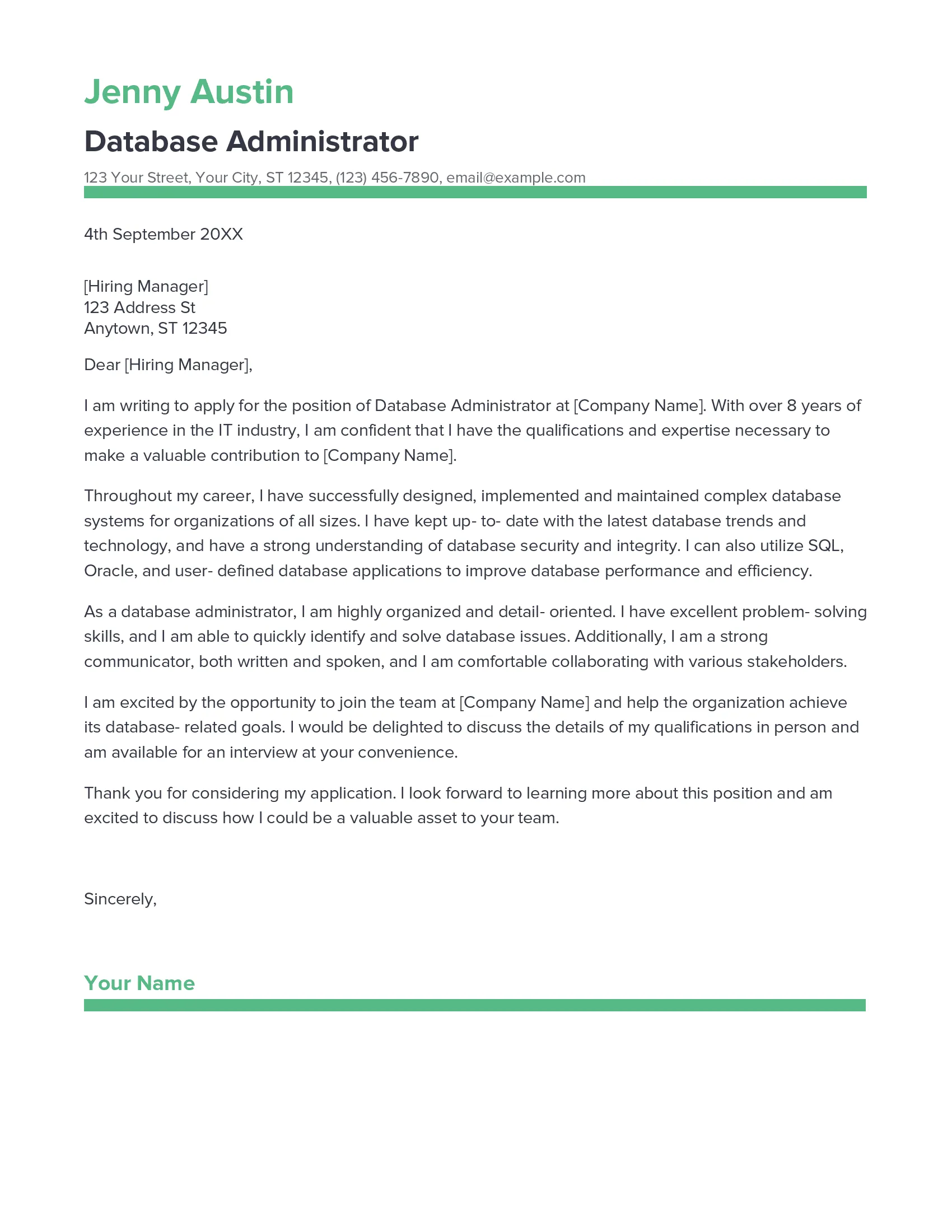Highlight Your Oracle DBA Skills
Your cover letter is your first chance to impress a potential employer, and for an Oracle Database Administrator (DBA), highlighting your skills is paramount. This is not just about listing your technical proficiencies, but about showcasing how those skills translate into tangible benefits for the company. Remember, a well-crafted cover letter is a marketing tool that sells your abilities and potential. The goal is to create a compelling narrative that demonstrates your value and positions you as the ideal candidate to manage and optimize their Oracle database systems. Focus on what you can bring to the table and solve their problems.
Technical Skills to Showcase
The IT landscape demands technical expertise, so your cover letter needs to be a showcase of your abilities. Start by listing your core competencies, such as SQL, PL/SQL, database design, and data modeling. However, don’t stop there; differentiate yourself by highlighting areas of specialization and advanced skills. Make sure to include knowledge of Oracle versions, from older systems to the latest cloud-based offerings. Emphasize your familiarity with tools and utilities like Oracle Enterprise Manager, SQL Developer, and third-party solutions. Showcasing your skills in a way that is relevant to the job description is critical.
Database Performance Tuning
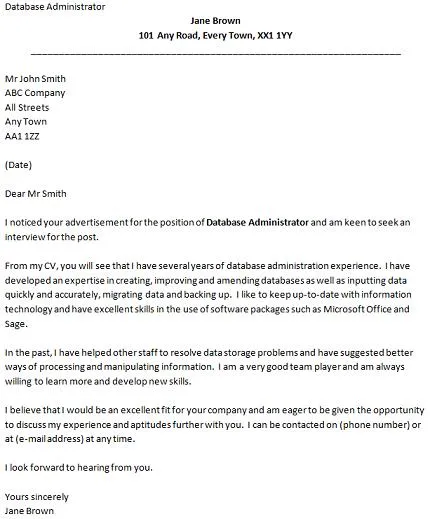
Performance is a crucial aspect of any database environment. Therefore, showing your skills in database performance tuning can set you apart. Describe your experience in identifying and resolving performance bottlenecks. Mention your proficiency in analyzing query execution plans, optimizing SQL queries, and tuning database parameters. If you’ve used any monitoring tools or implemented performance enhancements that led to measurable improvements, be sure to specify them in your cover letter. Employers are looking for candidates who can proactively ensure optimal database performance.
Backup and Recovery Expertise
Data loss can be catastrophic for a business, so emphasizing your expertise in backup and recovery is essential. Outline your experience with different backup strategies, such as RMAN (Recovery Manager), and your ability to implement and test them effectively. Detail your experience with various recovery scenarios, from point-in-time recovery to disaster recovery planning. Mention any experience with data replication and high availability solutions. The ability to safeguard the company’s data and ensure business continuity is a high priority for employers.
Security and Compliance
In an era of heightened cyber threats and strict regulatory compliance, your security and compliance skills are highly valuable. Highlight your experience with database security measures, such as user access control, encryption, and auditing. Mention your familiarity with security best practices and compliance standards, such as GDPR or HIPAA. Show that you are adept at implementing security protocols and ensuring data integrity and confidentiality. Demonstrate your understanding of how to protect the database against internal and external threats.
Emphasize Relevant Experience
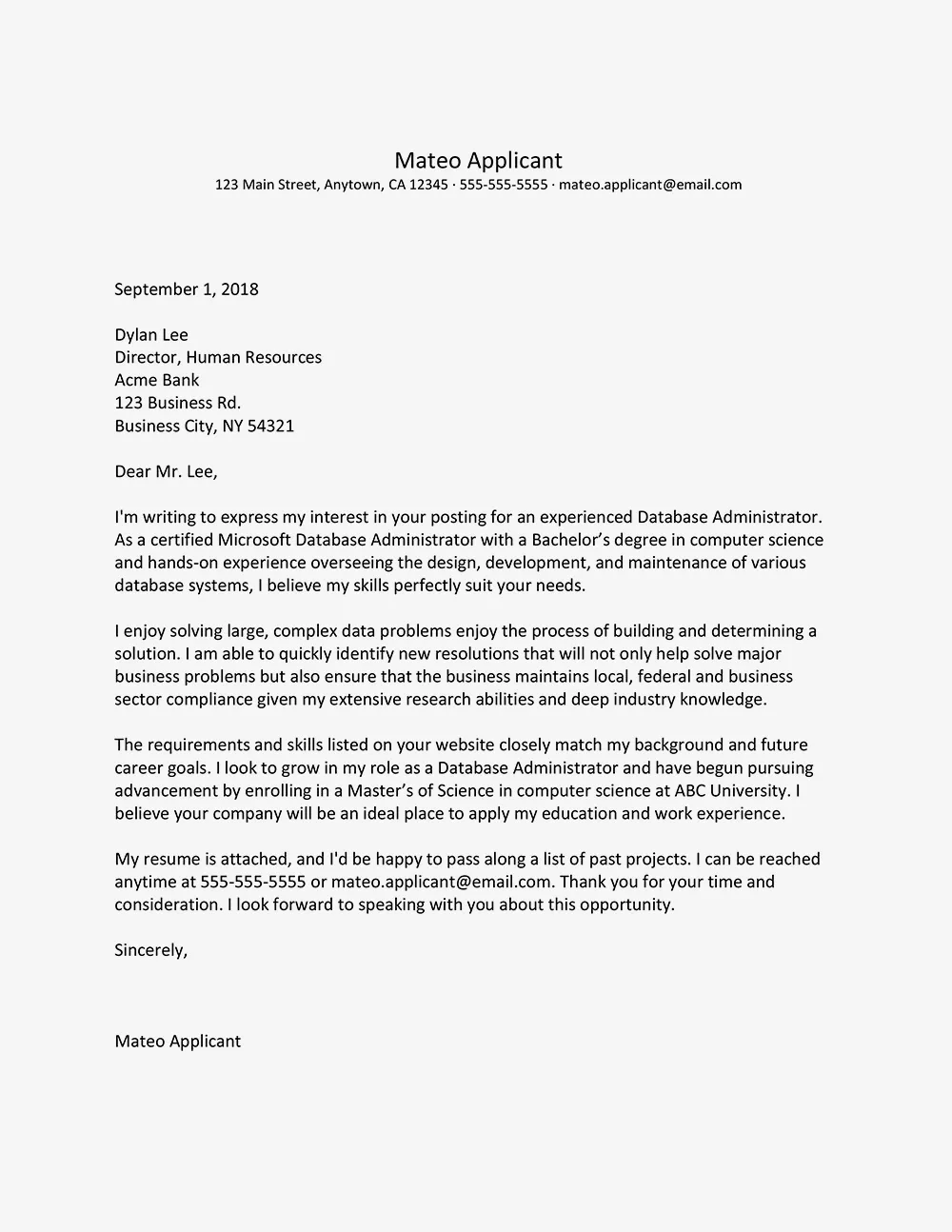
While skills are essential, your experience will solidify your qualifications. Your cover letter should demonstrate how you’ve applied those skills in real-world scenarios. Instead of just listing job titles, describe specific responsibilities and accomplishments that align with the job description. Showcase your hands-on experience with database administration, including installation, configuration, patching, and upgrades. Your goal is to make the connection between your past roles and the requirements of the new position crystal clear.
Quantify Accomplishments
Numbers speak louder than words. Instead of vague statements, quantify your accomplishments whenever possible. For example, rather than saying you ‘improved database performance,’ specify the percentage of performance improvement achieved through your actions. If you have reduced downtime, mention the reduction in hours or the percentage of improved uptime. Use data points to back up your claims and demonstrate the tangible value you brought to previous employers. Providing hard data will make your cover letter much more persuasive.
Project Management Experience
Many Oracle DBA roles involve project management responsibilities, such as database migrations, upgrades, or implementations. If you’ve led or participated in database-related projects, make sure to mention this experience. Briefly describe the projects, your role, and the successful outcomes. Highlight your skills in project planning, task management, and communication. Showing your ability to deliver projects on time and within budget will make you a highly desirable candidate.
Tailor Your Cover Letter to the Job
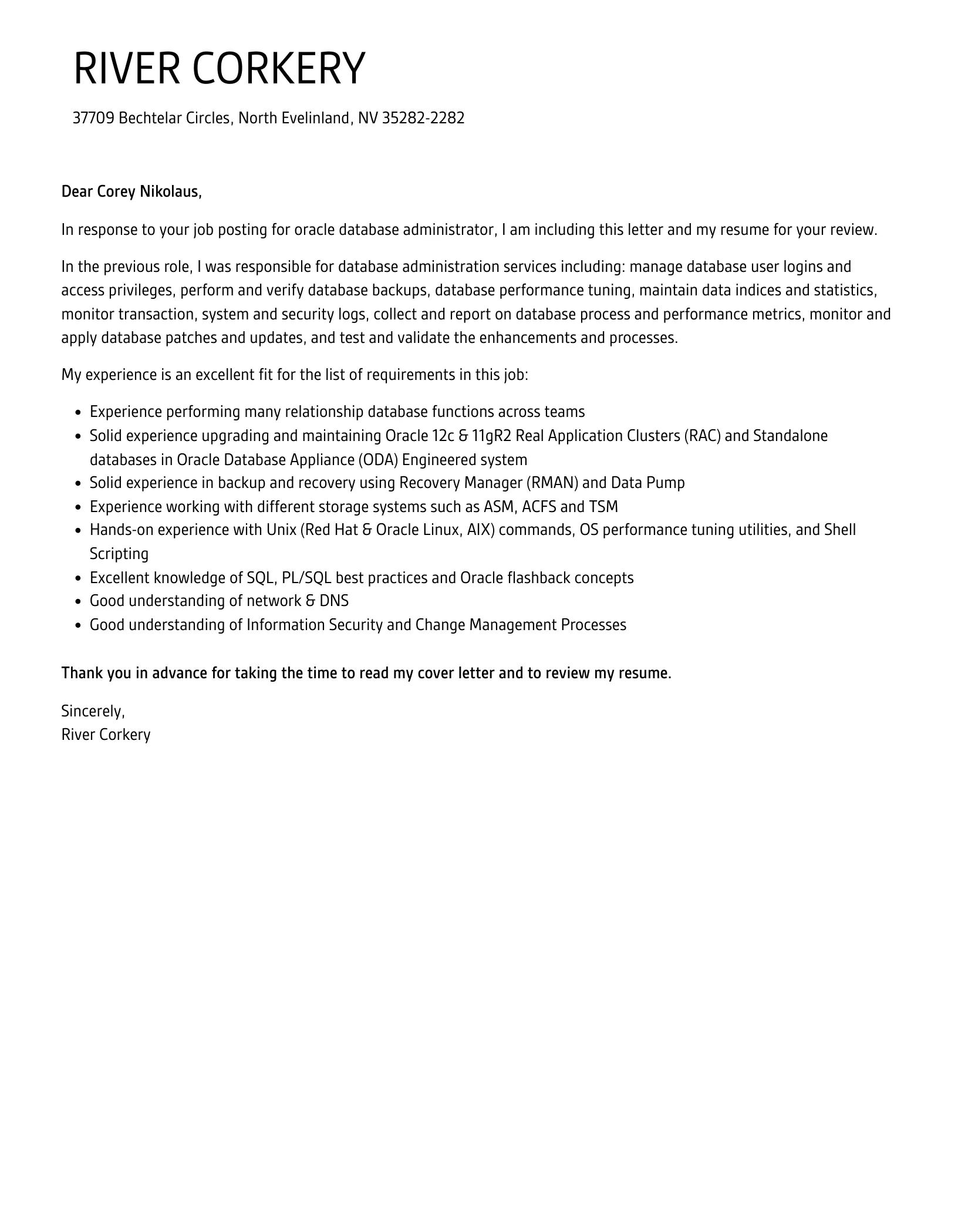
A generic cover letter is unlikely to impress hiring managers. Customizing your cover letter for each job application is crucial. This means taking the time to understand the specific requirements of each position and tailoring your letter to reflect those needs. Review the job description carefully and identify the key skills and experience the employer is seeking. Then, craft your cover letter to address those points directly, using the same keywords and phrases that are used in the job description. This shows that you are a good fit for the position and have taken the initiative to understand their needs.
Research the Company
Before writing your cover letter, do some research on the company. Understand their industry, their products or services, and their company culture. This knowledge will allow you to tailor your cover letter to resonate with the company’s values and priorities. If possible, identify specific projects or initiatives the company is undertaking and explain how your skills and experience can contribute to their success. Demonstrating that you understand the company’s business and have thought about how you can contribute will significantly boost your application.
Match Skills to Requirements
The job description is your roadmap. Carefully review the requirements and use them as a guide when writing your cover letter. Identify the essential skills and experience the employer is looking for and highlight how your qualifications align with those needs. Be specific in your examples and provide evidence of your abilities. Use the same keywords and phrases that are used in the job description to make it easy for the hiring manager to see that you are a good fit. Be sure to cover all essential requirements and don’t be afraid to provide additional information on any that are not directly listed.
Proofread and Polish Your Cover Letter
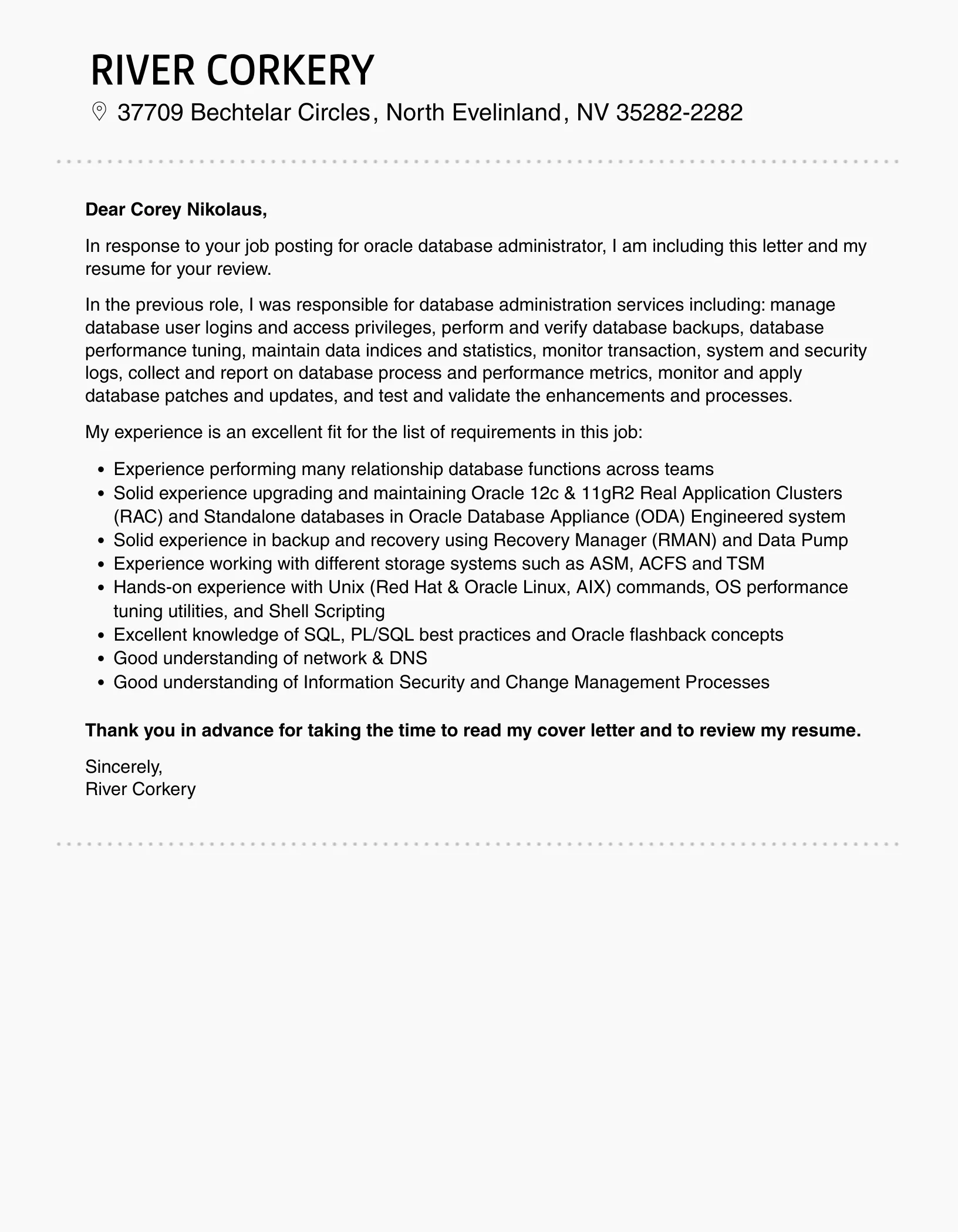
Attention to detail is critical for a DBA, and a polished cover letter demonstrates this quality. Before submitting your cover letter, proofread it carefully to ensure that it is free of grammatical errors, spelling mistakes, and typos. A single error can create a negative impression and undermine your credibility. Ideally, have someone else review your cover letter as well; a fresh pair of eyes can catch errors that you may have missed.
Formatting and Presentation
Your cover letter should be easy to read and visually appealing. Use a professional font, such as Times New Roman or Arial, and maintain consistent formatting throughout. Use clear headings and subheadings to organize your content and make it easy for the reader to find the information they need. Keep paragraphs concise and break up long blocks of text with bullet points or lists. Make sure your cover letter is well-structured and easy to navigate.
Grammar and Spelling Check
Grammar and spelling errors can damage your credibility. Use a grammar and spelling checker to catch any mistakes. However, don’t rely on these tools alone. Proofread your cover letter carefully to ensure that the writing is clear and concise. Ensure that you use correct punctuation and sentence structure. A well-written cover letter shows that you can communicate effectively and pay attention to detail.
Call to Action and Closing
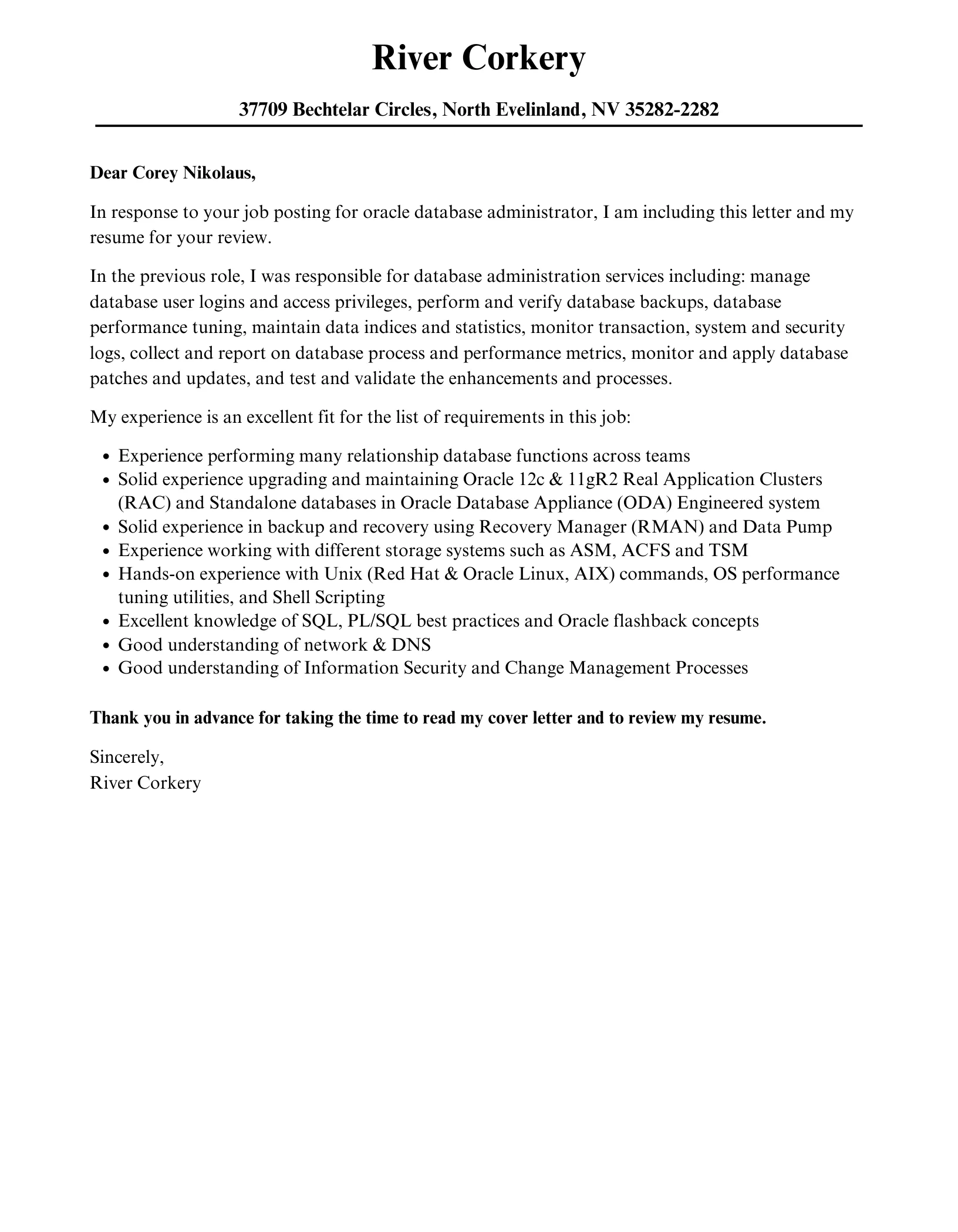
Your cover letter should conclude with a strong call to action. Express your enthusiasm for the position and reiterate your interest in the company. Provide your contact information and clearly state how the hiring manager can reach you. Thank the reader for their time and consideration. A well-crafted closing leaves a positive impression and increases the likelihood of securing an interview. A professional closing is just as crucial as the opening.
